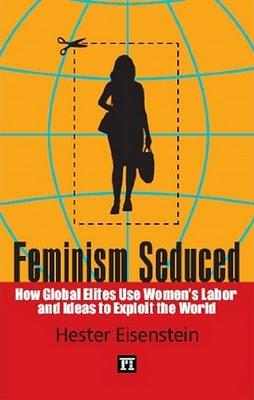Feminism Seduced: How Global Elites Use Women's Labor and Ideas to Exploit the World

I have been waiting for a book to tell me how things went wrong, how we ended up with lady cops and mothers in combat zones, how “feminist” became an insult. Did we women do it to ourselves, or were we pushed? Hester Eisenstein, professor of sociology at Queens College and the CUNY Graduate Center in New York City, has offered Feminism Seduced, which, as promised and despite its flaws, does map elements of the neoliberal project to some “feminist” initiatives, but it is not the book I have been wanting, the one that explains, not so much the academically popular theory of “recuperation,” but how the radical women might have kept the momentum of the women’s movement going and in the right direction.
Let’s get the most obvious major flaw of the book out of the way: the near total omission of lesbian-feminism, a powerful influence in the radical wing of the women’s movement in the 1970s. Though it is like blaming a reporter for the headline on her story to blame Eisenstein for the judgments of her indexer, the lack of an index entry for lesbianism reflects the extreme once-over-lightly she gives to the historical role of this feminist tendency, which cannot be subsumed under “queer theory” or dismissed with “conflicts over suppression of lesbian influence... eventually faded.”
Eisenstein’s nuanced concern about the limitations of the “women of color” construct apparently does not extend to the inability of the category “GLBT” to comfortably incorporate Rita Mae Brown’s “woman-identified woman.” This is a glaring oversight from an author who rightfully chastises a movement which often alienated women of color and working-class women.
Eisenstein’s argument or rather arguments are directed, she insists, mostly at hegemonic, state feminism (an approved version of reform feminism). She views feminism as driving out what she calls “labor feminism,” the initiatives for women within the labor movement that resulted in laws protecting women. Essentially she argues that women’s demands for wage equality, while benefiting professional women, put working- and lower-middle class women into poorly paid service jobs and undermined the expectation of a “family wage.” These feminist demands served to facilitate more direct anti-union activities begun by big business at the same time. (She seems less interested in the exclusion of women from trade unions in the higher paying blue-collar occupations like plumbing and carpentry.)
Moreover, feminist emphasis on paid labor undermined women’s work in the home and thus “welfare” programs. On a global level, feminism linked with modernity destroyed traditional societies and allowed access to markets to the forces of globalization, by focusing on such issues as “genital cutting,” which Eisenstein comes close to defending. She charges that the empowerment of individual Third World women through measures such as microfinance has taken the place of state-led development. She then recounts the use of feminist ideology in the promotion of imperialist initiatives, such as President George W. Bush crowing about liberating the women of Afghanistan from Taliban oppression, and in encouragement of Islamophobia.
The author presents a not entirely trustworthy account of feminist history and its continuance in women’s studies and a fairly standard leftist rendition of the neoliberal project—a lot of ground to cover. The reader is left to piece together her thesis from topic-based chapters that operate as silos, disrupting both the narrative history and the argument—without the aid of a Venn diagram.
In the end, she presents a post hoc analysis that stops short of proving her case against even mainstream feminism. Her solutions—maternalism, a socialist state, ACORN, and the California Nurses Association—seem neither particularly feminist nor radical. Perhaps that feminism is best that doesn’t take a gendered view of all the evils of the world but rather gives women the power of agency to uproot them.
I do not agree with your criticisms to the book and the author. As you said, the author's critics are trageted at mainstream feminism, not lesbian or LGBT studies. Moreover, to say that queer theory is representative of all feminisms is a misrepresentation.
I'm reading this now and agree with your points of criticism. SHe leaves out radical feminism as well- or presents a glib one liner or two about it. Lack of trustworthiness about her history is exactly how I've been putting it- and generally I just don't think she has the analytical chops to follow through on the central claim for which she amasses all this material. Standard leftist right. Nothing innovative at all, which is striking given the truly innovative insights and practices of women's liberation movement feminism that she omits from the picture.